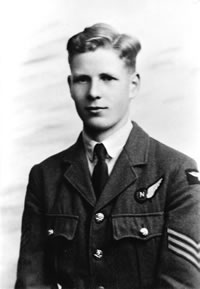
EnlistmentI came to London from Torquay in April 1940 to start work as a Post Office Youth in Training. My father, who was both working and living in his office, had found me a place to live in a Toc H hostel in Fitzroy Square just off the Tottenham Court Road. I worked in the Gray's Inn Road, near King's Cross, at the 'Terminus' and 'Directory Enquiries' exchange. I started to study for a BSc degree and the Post Office gave me one day a week off to attend Northampton Polytechnic. Most days I got up at 3 am to do four hours studying before breakfast. Every day I walked to work past Euston and Kings Cross Stations to the telephone exchange. Then the blitz started and as it hotted up I thought I had better get prepared so I bought a pair of thick trousers and a heavy sweater. In the event I did not have them off for weeks at a time and the walk to work was past increasing devastation as each week went by. My father never once suggested that it was dangerous for me to remain in London and that I would be safer if I went back to Torquay. The idea had not entered my head and I am sure he had never considered that I should get away from the battle: the possibility was never mentioned but all the same it had been a decisive turning point for if I had gone back to Torquay my life would have certainly turned out quite differently. As soon as it was started I joined the LDV (Local Defence Volunteers) as a unit was formed at the telephone exchange. Shortly afterwards the name was changed to Home Guard and slowly bits of uniform became available. Eventually I had a Royal Fusiliers badge in my cap and a complete uniform, including greatcoat and boots. I took my part time soldiering seriously; there was even a Battalion church parade when, cap badge and boots well polished, I marched from King's Cross to the Guards' chapel at Wellington Barracks. My studies were at an end because of the disruption of normal life. It was an exciting time and I came to no harm, but my father was injured by a landmine and spent some weeks in hospital. The Post Office paid me 28 shillings a week out of which I had to meet the cost of my board and lodging. I was not left with much pocket money. One morning, after reading a newspaper advertisement saying the RAF paid pilots and observers 13 shillings a day, I could not resist the temptation on my way to work to walk into the recruiting office in the hall of St Pancras parish church. I asked how old I had to be to join up to fly. The answer was eighteen. I was only seventeen. I promptly gave myself a new birthday: 20 December 1922. I was enlisted in the RAFVR (RAF Volunteer Reserve) then had to wait for the aircrew medical examination and an interview. I practised for the medical every evening by putting my head in a basin of water to see how long I could hold my breath, by standing on one leg with my eyes closed, and by trying to touch my toes without bending at the knees. In May I went to the aircrew selection centre, near Euston station. I was given a form to fill in. One of the questions asked for my date of birth. I had forgotten the date I used at the recruiting office so did the only thing possible. I went up to a corporal sitting with a pile of documents and asked if he could tell me when I was born. He kept an absolutely straight face, made no comment, leafed through the papers and gave me the answer. The time spent half drowned in a Toc H washbasin was worthwhile: I was passed fit to fly. I had only a hazy idea of what pilots and observers did, my sole contact with flying having been an afternoon tour around Croydon airport with my mother. Then came an interview with a Wing Commander. I realise now that he wanted to discover if I had the potential to be a navigator, for the qualities needed were probably rarer than those sought in future pilots. When he found I had at least heard of spherical trigonometry the Wing Commander said I was just the sort of chap the Air Force wanted as an Observer to do the brainy job of navigating its aeroplanes and that it was much more responsible and interesting work than being a pilot. Having been assured that the job paid 13 shillings a day I saw no reason to argue. I did not have the courage to tell my parents what I had done. Then in the post came the instruction to report at No. 1 ACRC (Air Crew Reception Centre). A day or so later I was walking up the Tottenham Court Road with my father and with considerable trepidation told him that I had joined the Air Force as an Observer. He asked if I had put my age on. When I said that I had he told me that he had done the same thing when he joined the army in 1915. I do not think he was surprised that I had joined up. We went for a walk together in Richmond Park the following weekend, my last as a civilian, and he spent almost the entire time teaching me the Morse code, which was a change from the mental arithmetic problems he usually threw at me when out together! 30 June 1941 was my real eighteenth birthday, and on 16 July I arrived at Lord's cricket ground, the home of No. 1 ACRC. |

